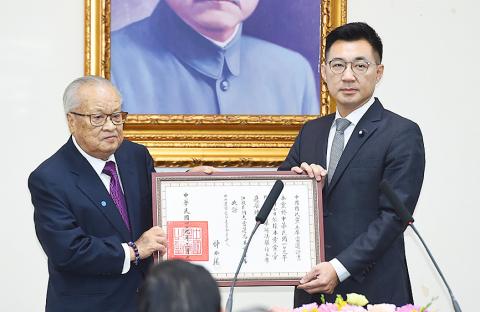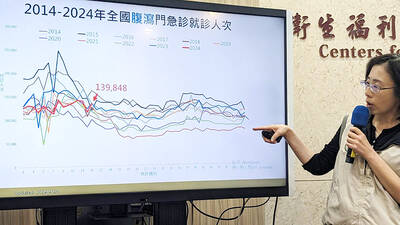Chinese Nationalist Party (KMT) Legislator Johnny Chiang (江啟臣) pledged urgent reforms as he was sworn in as the party’s new chairman yesterday.
“The end of the by-election is the beginning of unity,” Chiang said at his swearing-in at KMT headquarters in Taipei, which was attended by former president Ma Ying-jeou (馬英九), and former party chairmen Wu Poh-hsiung (吳伯雄) and Wu Den-yih (吳敦義), among others.
Saturday’s by-election was held to fill the vacancy left by Wu, who stepped down last month after the party’s losses in the Jan. 11 presidential and legislative elections.

Photo: Liao Chen-huei, Taipei Times
Chiang defeated his sole opponent, former Taipei mayor Hau Lung-bin (郝龍斌), by taking nearly 69 percent of the vote.
“I have always believed that what is needed between generations is dialogue and not confrontation; what is needed is cooperation and not conflict,” Chiang said, adding that as party chairman, he hopes to facilitate understanding and cooperation among different generations within the party.
The KMT’s defeats in the presidential elections in 2016 and this year “highlight that the party is behind the times in many aspects and urgently needs to catch up through reform and innovation,” he said. “We do not have any time to waste.”
“In an age of democracy, the KMT can no longer expect a wise leader to make all the decisions,” he said, adding that he would promote a collective leadership.
Chiang has proposed the creation of an 11-member “decisionmaking platform” within the party that he says would advise the chairperson and assist them in the decisionmaking process by presenting a diverse range of views.
Speaking on cross-strait policy, Chiang said: “My basic principle is to stick to the values of the Republic of China’s free and democratic system and strive for cross-strait peace and common well-being.”
While trust needed to be “rebuilt” between Taiwan and China, the KMT’s most important task at the moment is its own reform and transformation, Chiang said.
KMT Central Standing Committee member Lin Rong-te (林榮德), who served as acting chairman after Wu stepped down in January, said that the coming year would be key in determining whether the KMT can return to power.
Wu Poh-hsiung said that he “dare not say ‘congratulations’” to Chiang, given the task that lies ahead.
“This is not the attainment of power and status, but rather dedication and sacrifice for a difficult job,” he said.
Ma, who is also a former KMT chairman, said while he agrees that the party should first focus on reform, its position on Taiwan’s relationship with the world and with China should also be priorities.
Taiwan should have “close relations” with the US, “peaceful relations” with China and “friendly relations” with Japan, he said.
Chiang, 48, is a US-educated politician who entered politics in 2010 when he was appointed minister of the Executive Yuan’s now-defunct Government Information Office.
He has won a legislative seat in Taichung’s eighth electoral district for three consecutive elections beginning in 2012 and received more votes that any other KMT candidate in the Jan. 11 legislative election.
Additional reporting by CNA

FLU SEASON: Twenty-six severe cases were reported from Tuesday last week to Monday, including a seven-year-old girl diagnosed with influenza-associated encephalopathy Nearly 140,000 people sought medical assistance for diarrhea last week, the Centers for Disease Control (CDC) said on Tuesday. From April 7 to Saturday last week, 139,848 people sought medical help for diarrhea-related illness, a 15.7 percent increase from last week’s 120,868 reports, CDC Epidemic Intelligence Center Deputy Director Lee Chia-lin (李佳琳) said. The number of people who reported diarrhea-related illness last week was the fourth highest in the same time period over the past decade, Lee said. Over the past four weeks, 203 mass illness cases had been reported, nearly four times higher than the 54 cases documented in the same period

A group of Taiwanese-American and Tibetan-American students at Harvard University on Saturday disrupted Chinese Ambassador to the US Xie Feng’s (謝鋒) speech at the school, accusing him of being responsible for numerous human rights violations. Four students — two Taiwanese Americans and two from Tibet — held up banners inside a conference hall where Xie was delivering a speech at the opening ceremony of the Harvard Kennedy School China Conference 2024. In a video clip provided by the Coalition of Students Resisting the CCP (Chinese Communist Party), Taiwanese-American Cosette Wu (吳亭樺) and Tibetan-American Tsering Yangchen are seen holding banners that together read:

Heat advisories were in effect for nine administrative regions yesterday afternoon as warm southwesterly winds pushed temperatures above 38°C in parts of southern Taiwan, the Central Weather Administration (CWA) said. As of 3:30pm yesterday, Tainan’s Yujing District (玉井) had recorded the day’s highest temperature of 39.7°C, though the measurement will not be included in Taiwan’s official heat records since Yujing is an automatic rather than manually operated weather station, the CWA said. Highs recorded in other areas were 38.7°C in Kaohsiung’s Neimen District (內門), 38.2°C in Chiayi City and 38.1°C in Pingtung’s Sandimen Township (三地門), CWA data showed. The spell of scorching

UNAWARE: Many people sit for long hours every day and eat unhealthy foods, putting them at greater risk of developing one of the ‘three highs,’ an expert said More than 30 percent of adults aged 40 or older who underwent a government-funded health exam were unaware they had at least one of the “three highs” — high blood pressure, high blood lipids or high blood sugar, the Health Promotion Administration (HPA) said yesterday. Among adults aged 40 or older who said they did not have any of the “three highs” before taking the health exam, more than 30 percent were found to have at least one of them, Adult Preventive Health Examination Service data from 2022 showed. People with long-term medical conditions such as hypertension or diabetes usually do not